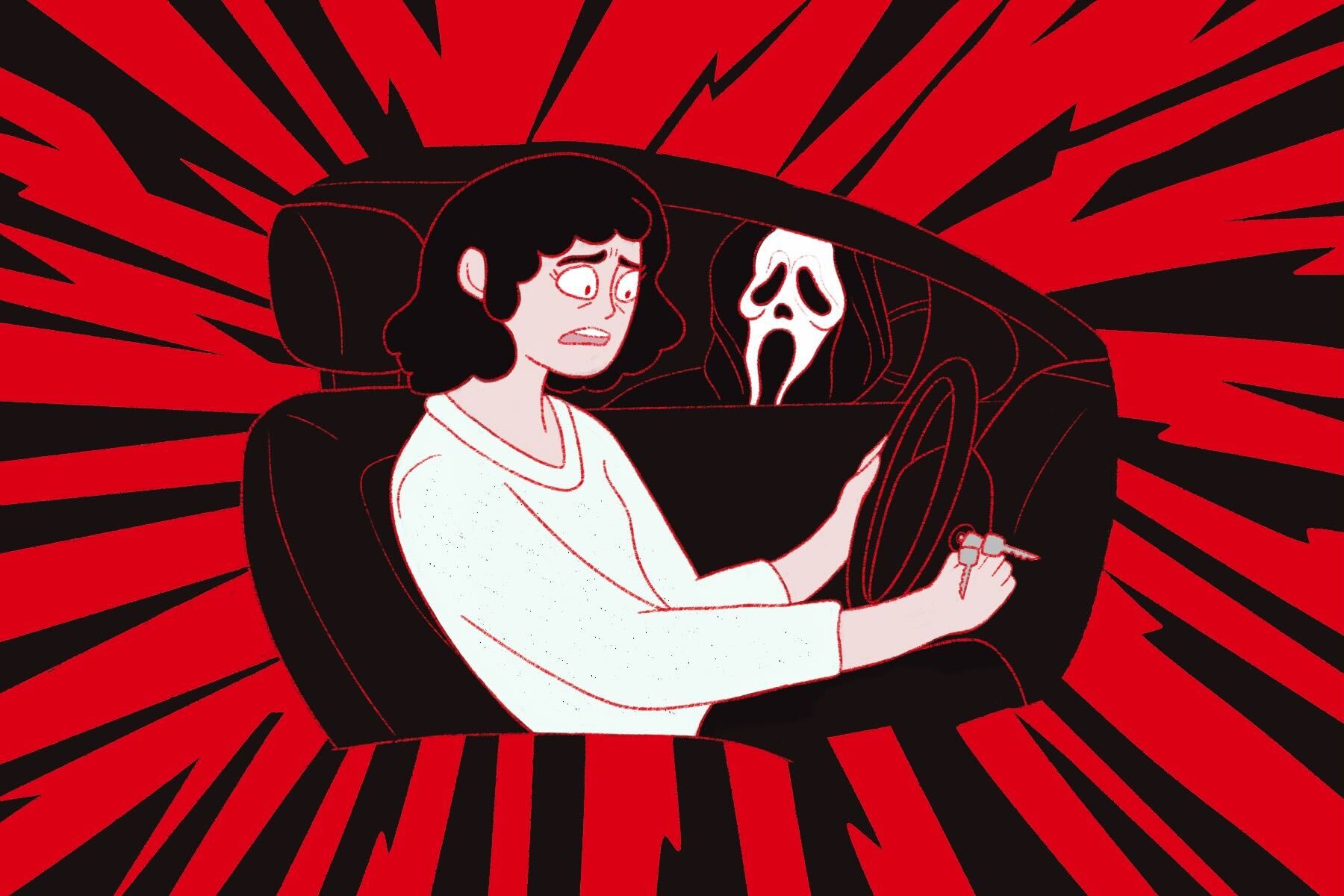Blumhouse Productions’ newest horror film, “The Black Phone,” has been a smash with critics and audiences. Based on a short story of the same name by Joe Hill, the film follows the plight of Finney Shaw, a young boy imprisoned by a masked serial killer known as The Grabber. The only other thing in his soundproof cell is a disconnected black phone, which Shaw soon realizes can be used to communicate with the dead — more specifically, The Grabber’s past victims. With their useful tips, Shaw begins planning his escape, all while dealing with his captor’s antics. Elsewhere, his psychic younger sister, Gwen, begins having visions that may just help uncover her brother’s whereabouts.
“The Black Phone” serves as another addition to Blumhouse’s ever-increasing roster of horror films. Upon watching them, you may learn to recognize several moments that feel as though they’ve occurred in other films, and in nearly the exact same way, too. You probably felt tense and shocked when you first watched them alone or with the attendees of your midnight viewing party, but after spotting them several times in several unrelated films, you begin to wonder if maybe the director stole some ideas from another director’s work. Most of the time, this is not the case. It’s merely you spotting film cliches.
A cliche is any kind of expression that has been overused to the point of tediousness. Take the phrase “red as a rose” for example. That would be considered a cliche in writing. For films, cliches come in the form of certain plot points that have been frequently used in other films. Each genre of film has its own unique set of cliches: For superhero films, it’s the blue beam in the sky, the 20-minute final fight between hero and villain or the science experiment gone wrong. For romance films, it’s two lovers meeting each other through wacky circumstances, the ultimate makeover and the confession before one person leaves the country forever. These cliches have become so overused they’ve almost become the standard in making a successful film.
Horror, like all other film genres, has its own set of cliches. This list will go over some of the most overused ones seen in the genre. When they first started, they might’ve shocked and astounded audiences, but now that every horror film uses them, they’ve become predictable.
1. Relentless Jump Scares
With the perfect buildup and correct implementation, jump scares can be an effective way to scare your audience. But they’re only effective when they’re used sparingly, as overuse quickly leads to them growing dull and annoying. “Insidious” and “The Conjuring” are recognized for their strong usage of jump scares. But while these films are willing to switch up scare tactics from time to time, other films seem to rely solely on jump scares, a prime example being “The Nun.” Even worse, some films will get so desperate to give their audiences a quick spook that they’ll turn to false jump scares. Essentially, this is when something non-scary comes out, but a loud, jarring scary noise plays anyway.
2. The Car Won’t Start
Whenever a victim is being chased by a killer, their first instinct, upon spotting a car, is to hop into it. That’s what anyone with a brain would do, right? But when they try to start the car, it just won’t work. Even if the car is brand new, it won’t start once the owner is being chased, as though the killer can control the car with their mind. This particular inconvenience has been shown in films like “Cujo,” “Poltergeist” and the original “Evil Dead.” It certainly is an easy way to build tension with little effort, but you begin to wonder just why the car has to stop working at the exact moment the monster is close.
3. The Killer Is Still Alive
After a long, terrible struggle, the main character finally slays the killer, ending their long, living nightmare. But as they return to a life of normalcy, the movie cuts to a scene where we learn that, no, the killer isn’t dead after all. They were very close to dying but thanks to luck, some kind of supernatural event or invincibility, they are still lurking in the shadows. And they’ll sure be back in the sequel! It’s often slashers that use this trope to keep their killers returning for future film installments. Films like “Halloween,” “Nightmare On Elm Street” and “Friday The 13th” benefit from the cliché because ending Freddy Krueger or Michael Myers for good would make the fans sob and keep the dollars from rolling in.
4. The Viewer Gets Attacked
This is somewhat related to the “endless jump scares” cliche, as many of those same films use this cliché as well. Just as the film is about to end, the monster lunges toward one last person, but this person isn’t a character in the film — it’s the viewer themselves. “Sinister” does this, “Paranormal Activity” does this, “Krampus” does this — it’s the film’s way of saying goodbye. It’s also a way of sending the viewer away with their heart racing, as if most of the film hadn’t already done that. What makes it funny is that, from the perspective of a character in the film (if they were watching), it would look as though the monster were lunging at thin air.
5. Useless Cops
Say what you will about them: A cop’s job is hard. They have to deal with all sorts of trouble on a daily basis. But in horror films, the cops are almost always useless, even if they’re totally competent; they become nothing more than meat bags for the killer to slice and dice into a bloody mess, despite their skills. That, or they deny the terrible happenings and leave, forcing the main character to confront the source of evil themselves. You’ll meet cops like this in films such as “Gremlins” and “Candyman.”
6. Useless Phones
What’s worse than a useless cop? A useless phone. Our phones are a great way for us to call for help when we need it, but if the horror film is to pass the 90-minute mark and involve lots of suspense and bloodshed, it must fail no matter what. Usually, this failure comes in the form of low reception or a dead battery (which would make sense if the phone is from Apple), rendering the phone completely useless unless the main character intends to use it as a ranged weapon. Films like “The Hills Have Eyes” and “Saw” show the characters’ phones failing them completely. Just hope that yours doesn’t if you wind up trapped in a horror scenario.
7. The Happy Ending Abruptly Turns Bad
Much like the “killer is still alive” cliche, this particular cliche has the main character finally overcome the evil they faced, only for them to later realize that something is wrong, something is out-of-place and the evil they seemingly destroyed is not dead at all. The happiness you and the character felt withers away and the film ends on a depressing note. “The Ring” and “Life” are two great examples of films whose endings start golden, but finish bleakly. Bad endings are not unusual for horror, but they’re used so much that happy endings become surprising.
8. The Falling Woman
In many horror films, the main character is a woman. Women are easy to sympathize with when they’re under attack by monsters or demons because we believe them to be helpless, afraid and in need of a protector. Thankfully, many women in horror have been shown to rise above these stereotypes by fighting back against the monsters, like Ellen Ripley of “Aliens” and Tree Gelbman of “Happy Death Day.” But no matter how strong or able a woman is, if she’s in horror, she’s bound to fall for no particular reason at all. She could be running at full speed over even ground and suddenly she just trips, and the monster gets one step closer to her.
Cliches will always exist in films, and while that’s not necessarily bad, it’s nice to see more originality instead of the same old tropes. It takes lots of creativity to create something out of the ordinary, but anyone can do it if they put in the effort. And if the creator decides to implement some cliches, they should try to change them up a bit to keep them fresh.
















